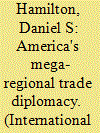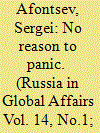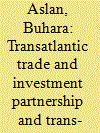| Srl | Item |
| 1 |
ID:
129969


|
|
|
|
|
| Publication |
2014.
|
| Summary/Abstract |
The United States is currently negotiating two massive regional economic agreements, one with 11 Asian and Pacific Rim countries and the other with the 28-member European Union. The Trans-Pacific Partnership (TPP) and the Transatlantic Trade and Investment Partnership (TTIP) herald a substantial shift in US foreign economic policy as Washington turns its focus from the stalemated Doha Round of multilateral trade negotiations and scattered bilateral trade agreements to 'mega-regional' trade diplomacy. As the only party to both negotiations, Washington seeks to leverage issues in one to advance its interests in the other, while reinvigorating US global leadership.
|
|
|
|
|
|
|
|
|
|
|
|
|
|
|
|
| 2 |
ID:
139953


|
|
|
|
|
| Summary/Abstract |
As summer slowly unfolded in Washington in 2015, the global trade bill was tenuously moving forward after surviving more than one near-death experience. It is a syndrome as well as a legislative event: No global trade liberalization agreement has advanced beyond the aspirational stage since the Uruguay Round was completed more than 20 years ago, and the United States has managed to finish only one substantial regional agreement, the North American Free Trade Agreement (NAFTA), since 1994. There is a simple explanation for this indecisiveness and inaction: Trade liberalization is hard to sell to a skeptical public bombarded with populist fear of competition from a succession of low-wage countries, and political leaders have consistently failed to muster the political will to push agreements to completion.
|
|
|
|
|
|
|
|
|
|
|
|
|
|
|
|
| 3 |
ID:
144947


|
|
|
|
|
| Summary/Abstract |
The formation of the Trans-Pacific Partnership (TPP) has a good chance to become a turning point in the development of regional economic cooperation. Now that the first wave of both enthusiastic and angry comments on the TPP agreement has subsided, it is time to ask the main question: What is its novelty for the world economy and politics?
|
|
|
|
|
|
|
|
|
|
|
|
|
|
|
|
| 4 |
ID:
120527


|
|
|
| 5 |
ID:
159601


|
|
|
|
|
| Summary/Abstract |
Negotiations on the Transatlantic Trade and Investment Partnership (TTIP) commenced in 2013, and soon became the most controversial bilateral trade agreement negotiations ever attempted by the European Union (EU). When trying to understand the escalating debate over the proposed agreement, most analyses have highlighted opposition to the deal, especially from civil society organizations. However, a full understanding of the debate surrounding TTIP requires analysis of supporters’ responses, as these changed in response to strategies used by opponents of the agreement. This article uses a novel approach in trade policy scholarship—rhetorical analysis—to focus on the European Commission Trade Directorate’s response to contestation over TTIP. Drawing on work on the ‘rhetoric of reaction’, this article identifies the rhetorical strategies used by EU trade commissioners from 2013 to 2016. It outlines the evolution of the rhetoric and accompanying changes in process and policy, providing insights on the impact of TTIP politicization on the guiding principles of the EU’s trade policy.
|
|
|
|
|
|
|
|
|
|
|
|
|
|
|
|
| 6 |
ID:
141699


|
|
|
|
|
| Summary/Abstract |
As a result of deadlocked multilateral trade negotiations, many countries have embarked on the establishment of bilateral and regional trade agreements. Using the Global Trade Analysis Project database and a computable general equilibrium model, our paper focuses on the impacts of the Transatlantic Trade and Investment Partnership (TTIP) and the Trans-Pacific Partnership (TPP) on the Chinese economy under three scenarios. The results suggest that when only the TTIP is realized, Chinese economic variables are negatively affected. When both the TTIP and the TPP are realized and China is excluded, the combined damage to the Chinese economy is higher than the damage with the TTIP alone. However, the inclusion of China in the TPP has a positively effect on economic variables in China. This indicates that the impacts of China's participation in the TPP compensate for the negative impacts of the TTIP. Therefore, China should consider being part of the TPP to offset the negative impacts of the TTIP.
|
|
|
|
|
|
|
|
|
|
|
|
|
|
|
|
| 7 |
ID:
163650


|
|
|
|
|
| Summary/Abstract |
Although stalled since 2016, the negotiations on a Transatlantic Trade and Investment Partnership (TTIP) have had major unintended consequences. The TTIP led to demands from third countries to upgrade their trade relationship with the EU and to unprecedented politicisation. As second-order effects of the latter, it endangered the EU-Canada trade agreement and brought about reform of EU trade governance and amendments to EU trade policy positions. These unintended consequences occurred because of inflated expectations about and insufficient awareness of the different nature of TTIP with regard to scope and partner compared to other trade negotiations. In the meantime, EU trade policy has adapted to the new politics of trade, making unintended consequences less likely.
|
|
|
|
|
|
|
|
|
|
|
|
|
|
|
|